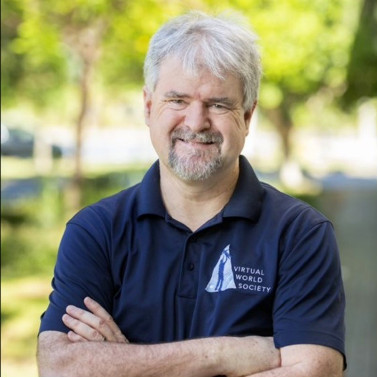Research Directions in Cross Reality
Mark Billinghurst
University of South Australia in Adelaide, Australia
University of Auckland in Auckland, New Zealand.
Abstract:
For thirty years people have been exploring the field of Mixed Reality – developing computer interfaces that span the continuum from Reality to Virtual Reality. However there are significant research opportunities in Cross Reality interfaces, those that support transitions along the Mixed Reality continuum, or connection between different points on the continuum. The presentation describes further the concept of Cross Reality and how it connects together Augmented Reality and Virtual Reality experiences. It also discusses important research directions in Cross Reality, such as enhanced communication cues, avatars, scene capture and asynchronous communication. Finally, the concept of Empathic Computing will be introduced, connecting together many of these research areas.

Mark Billinghurst is Director of the Empathic Computing Laboratory, and Professor at the University of South Australia in Adelaide, Australia, and also at the University of Auckland in Auckland, New Zealand. He earned a PhD in 2002 from the University of Washington and conducts research on how virtual and real worlds can be merged, publishing over 650 papers on Augmented Reality, Virtual Reality, remote collaboration, Empathic Computing, and related topics. In 2013 he was elected as a Fellow of the Royal Society of New Zealand, and in 2019 was given the ISMAR Career Impact Award in recognition for lifetime contribution to AR research and commercialization. In 2022 he was selected for the ACM SIGCHI Academy, for leading human-computer interaction researchers, and also selected for the IEEE VGTC VR Academy for leading VR researchers.
For more details: https://profiles.auckland.ac.nz/mark-billinghurst
Evaluating the User Interaction Experience with Artificial Social Agents
Willem-Paul Brinkman
Delft University of Technology, The Netherlands
Abstract:
Since 2018, a group of international researchers has been developing a validated, standardized questionnaire instrument to measure users’ interaction experiences with artificial social agents (ASA), such as virtual agents, conversational agents, and social robots. In this talk, an overview of the group’s progress will be presented, starting with the identification of interaction aspects to be captured by the instrument, the creation of both long and short versions of the ASA questionnaire (ASAQ), and insights obtained from various validation studies involving over 1,000 individuals worldwide. Furthermore, the talk will cover the validated translations of the original English questionnaire into Chinese, German, and Dutch. The primary goal of this research is to provide the community with a tool to evaluate agents and compare results across user studies, thereby supporting the reproducibility of scientific findings.

Willem-Paul Brinkman is an associate professor at Delft University of Technology, The Netherlands. His research on digital behaviour change focuses on human interaction with artificial intelligence (AI) for behaviour change, specifically systems in the health or training domain that include psychology-informed AI that offers psychological assessment, support, therapy, or training. As empirical research forms a cornerstone of his work, he has developed and validated measurement instruments for technology adoption, usability, and emotions. He has co-authored over 200 scientific publications and holds leading positions in several national research projects.
For more details: https://ii.tudelft.nl/evalquest/
